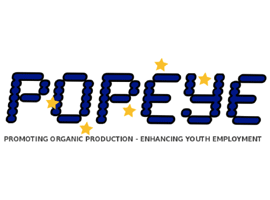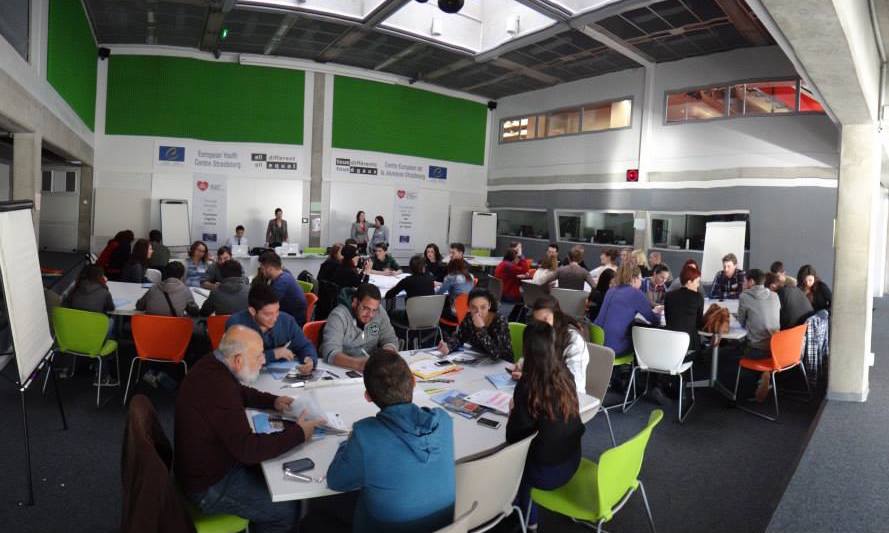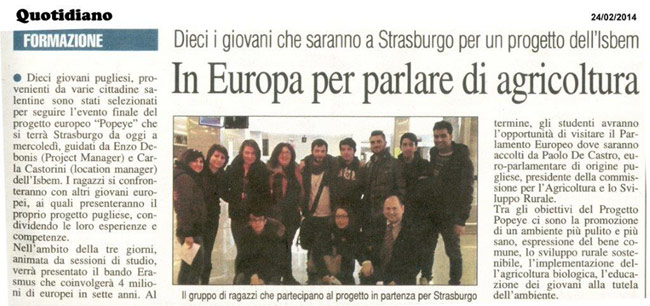
AT A GLANCE
POPEYE brings together eight partners from six different European countries, namely France, Bulgaria, Cyprus, Estonia, Croatia and Italy. The aim of the project is to involve disadvantaged youngsters from rural areas in their territories’ life, to provide them with a deep understanding of their areas’ economic and environmental demands and problems and of their potential role in local public life.
At the same time, POPEYE will meet the needs of the communities and youth the project is addressed to, by enhancing rural sustainable development through the promotion of organic farming while educating youngsters in environmental protection and providing them with professional contacts with local organic farmers.

OBJECTIVES
The project aims at achieving the following objectives:
- The promotion of active participation in society among disadvantaged young people;
- The enhancement of the sense of belonging to their communities and to Europe among the participants;
- The raising of the participants’ environmental consciousness;
- The creation of potentially professional opportunities and contacts around the participants;
- The promotion of dialogue among young people and their communities and local authorities on relevant social themes and on issues regarding youth.
ACTIVITIES
POPEYE foresees 7 steps, having impact both at local and European level. Most of the activities will be implemented at the local level and through local contacts. ALDA will create a model of development of the activities and set the standards for their implementation, but their concrete management will be a partners’ task.
- Preparatory Activity: During Activity 1, each partner will identify and involve 40 economically, culturally or socially disadvantaged young people aged 15-25, living in its geographical area. The participants will be selected by the partner organisations, possibly in collaboration with local authorities so as to better identify the target groups in the areas concerned.
During this same phase, the partners, in collaboration with local authorities and/or local associations of farmers, will identify and contact organic farmers potentially willing to cooperate with the project. - Educational Activity: During this phase of the project, each local partner will organise a 5-days’ educational event for its participants, consisting in a 2 days of seminar and 3 days of training on ICT and digital mapping. At the end of this phase, each partner will select 10 participants willing to further contribute to the project. They will be the ones who will take part in the following activities.
- Digital mapping: During the third phase of the project, the selected participants (10 per partner) will contact the organic farmers of their geographical area and collect data about their geographical position, their features as producers and sellers as well as their characteristics as potential hosts of trainees.
- Development of the website: Each group of 10 participants will set up a “national” webpage bringing together all the information collected on the ground. The website, through dedicated filters, will list all the farms “mapped” under several items: country, typology of production and its special characteristics, characteristics of the proposed traineeship, availability of the traineeship in a certain period of time.
- Local dissemination events & promotion of the website among potential users: Each group of participants will organise a local event for disseminating the project results within the local community and especially among young people. Activity 5 will also be an occasion for promoting the concrete output of the project, the website, among other young people. Thus, not only the results of the project in terms of higher youth participation and lowered marginalisation will be disseminated, but a concrete tool for bringing young people closer to organic farming will be promoted among potential end users.
- Final international event: The event will be held in Strasbourg in February 2014. It will reunite 70 young participants (10 per partner) and 1 representative from each partner organisation. Each national group will be invited to showcase the results obtained during the project, with a particular focus on the involvement of its local community and local authorities in the project, on understanding its relevance and on planning its follow-up.
- Evaluation & dissemination: The evaluation activity will involve all the partners and the participants, which will contribute to define the results reached by the project in all its phases.
The project results and especially its concrete output, the website, will be promoted by the instruments of dissemination provided by ALDA and its partners (organisations’ websites and newsletters and contacts with local and international media).
